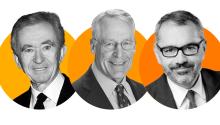Clarity of thought: How advisers can help make better decisions

Ultra high net worth (UHNW) families are faced with an ongoing series of highly complex, multi-generational wealth management challenges. A new study, Family Decision-Making, the Campden Wealth/Morgan Stanley Private Wealth Management North American Family Wealth Report 2016, explores how UHNW families make important decisions and what roles their advisers play in those processes. David Bokman, managing director and head of UHNW resources at Morgan Stanley, gives CampdenFO his take on the survey results and how they might be used to help affluent families make more effective and harmonious wealth management decisions.
CampdenFO (FO):The new study suggests that more formal decision-making processes tend to promote more harmonious family relationships. Why do you believe that is the case?
David Bokman (DB):Formal processes add a level of objectivity. They provide specific occurrences and mechanisms for communication that can be less confrontational. When the answer to a specific family-member request is 'no', the procedures help the family member to understand that the decision is not arbitrary or personal as it relates to them, but is the result of a rational, consistent process. With formal processes in place, it is also less likely that families will postpone discussions of delicate, but important issues.
FO:There is an interesting disconnect in the report: 56% of respondents view investment policy statements (IPS) as important, yet only 39% have them for their families. Would you advise more families to develop an IPS?
DB:Absolutely, I would encourage families to do so, particularly as a collective effort. Among their many benefits, Investment Policy Statements reinforce good family governance and improve communication within the family, and between the family and advisers.
FO: The report suggests that UHNW families see considerable value in advisers who can help them look at wealth management more holistically, with capabilities that extend well beyond investment strategy. What is the value of this perspective?
DB: While we never diminish the importance of investment strategy, we find that a more comprehensive wealth management approach best serves the needs of the family. Issues related to financial education and family dynamics can have as significant an impact on a family's legacy as the performance of their portfolios. We believe that advisers have a critical role to play in guiding these family discussions, and encouraging our clients to use more formal processes in making these important decisions.
FO: Few UHNW families have formal processes to provide financial education to younger family members. How can advisers help to promote financial literacy in the next generation, and is that an appropriate and valued service to offer?
DB: No legacy can endure unless the younger generations are prepared to manage it when their time comes. An adviser can, and should, play a central role in this process. Involvement in the education of younger family members not only establishes a relationship with the next generation, but reinforces to the senior generation how important a comprehensive approach to financial management is to the adviser. It indicates how much the adviser values the client's success, with success defined in the broadest possible way. That success means not just investment returns and technically proficient estate plans that optimise tax results, but rather a feeling of health and satisfaction around how the wealth is being used to advance the family's broad goals and mission.
FO: The survey indicates that the clear majority of UHNW families rely on one or more advisers for guidance in making a broad range of wealth management decisions. What capabilities and qualities should they look for when selecting those advisers?
DB: It is important that advisers demonstrate progress not only towards quantitative goals, but also towards qualitative goals. Advisers who maintain narrow client engagements can only uncover the issues a family would like the adviser to address. Those who take a more expansive view create the opportunity to demonstrate value by asking questions the family didn't necessarily know need to be asked. That is one way in which an adviser who works with several wealthy families can be especially helpful. They can use insights gained from working with one family to explore similar issues that may impact another.
FO: What circumstances can lead to apathy among younger family members, and what steps can more senior family members take to engage them in family wealth decisions?
DB: Apathy comes easily when you are not included in a decision-making process. The senior generation does well to ask itself whether the junior family members feel appropriately included in the family conversations and whether they have an appropriate level of engagement in the decision-making process. The fact that the younger family members may seem apathetic does not necessarily mean there hasn't been sufficient communication or opportunity for involvement, but it's possible. That is an area worth exploring.
FO: Are there specific wealth management or investment strategy issues that have proven to be of particular interest to younger members of UHNW families?
DB: The consideration by the entire family of impact investing –the thoughtful consideration of social and environmental impact –is a particularly powerful way to get the entire family engaged in the investment process.
FO: Was there anything from the research that surprised you in either a positive or a negative sense?
DB: I was pleasantly surprised by the number of family members who have, or are implementing, a family mission statement. The survey reported that 58% of UHNW families have one or are developing one. In my experience, mission statements are something that families discuss, but a relatively small number actually implement. The increasing popularity of mission statements is a very positive development, and I am delighted to see it happening.
Interested in receiving the report? www.campdenresearch.com






